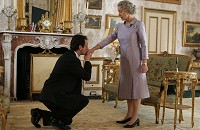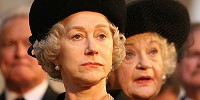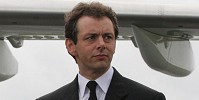 That imaginative leap
That imaginative leap Having just scooped up a handful of awards at the Venice Film Festival, the lead actors, director and writer of The Queen sit down with the London press to talk about their film. The atmosphere is lively and relaxed, although itís clear that theyíre a little tired of answering the same questions over and over again - mainly because the film has such a fiercely relevant, current subject matter.
Having just scooped up a handful of awards at the Venice Film Festival, the lead actors, director and writer of The Queen sit down with the London press to talk about their film. The atmosphere is lively and relaxed, although itís clear that theyíre a little tired of answering the same questions over and over again - mainly because the film has such a fiercely relevant, current subject matter.Stephen Frears seems the most fed up with stupid questions from journalists. He sits back in his chair, scruffy and unshaven, waiting until the moment he can get out and have a smoke. Itís a little newer for Peter Morgan, whoís sharp and witty, and speaks with impeccable comic timing.
Michael Sheen is surprisingly magnetic, leaping onto every opportunity to add a bit of humour to the proceedings, while Helen Mirren is poised and articulate and a little soft-spoken, and also clearly enjoying herself and the strange situation of being continually asked about what itís like to be someone sheís not.
Did you think about what the Queen herself might make of this film?
Helen Mirren: I considered it before we started work on it, in the sense that I felt that an honest effort was essential. Thatís all you can do in this situation, is just try and be as honest as you can. Once the film was done, the question that everybody wants to ask me in particular, and maybe the others as well: what do you think the Queen will make of it? I donít know - I have no idea. Itís not my place - how can I say? I suspect Robert Lacey was asked the same question - the great wonderful writer about the Royal Family. He said, ďI think the Queen will say, ĎWell, that could have been worse. Could I have a gin and tonic please?íĒ And thatís probably about as close as you can guess.
Michael Sheen: Do you envisage a sort of Prince and the Pauper situation? Where you can swap, and the Queen can know what itís like to be actress, and you can live her life?
HM: I think perhaps the Queen does know what itís like to be an actress.
How did you make it feel so authentic on screen, since itís obviously conjecture?
Peter Morgan: Well, I donít wish to take anything away from my staggering achievement, but quite a lot of it is on public record and you build up a picture of what actually happened. I did more and more research - the scenes sort of wrote themselves. The bits I enjoyed writing the most were the ones for which there is no public record whatsoever - such as the scenes between the Prime Minister and the Queen - which is the only time in either of their professional lives that itís un-minuted. And also all the family scenes in Balmoral. But we sort of knew that Blair spoke to the Queen a couple of times, and then to be honest with you there were a whole lot of people who couldnít wait to be in the script. Each of the palaces have their own agenda against the other palaces. Bear in mind that there are three different palaces, each of which brief furiously against one another, and they were anxious to get their own view across.
How did you get permission to film in these locations?
Stephen Frears: Nothing in the film is as it should be. We never filmed anywhere that is, as it were, right. I donít think one shot was filmed in what you might reasonably call the right place. I mean, the whole thing is illusion anyway. I mean, Iíve never been inside Buckingham Palace, but I canít believe there arenít other houses in the country that are like Buckingham Palace. In the end you sort of say thatís the most believable room we can find. And the same in Scotland. You know you do your best - God knows what the real places are like.
How do you prepare these kinds of roles?
HM: I very serendipitously bumped into Michael at a function, and I knew I was going to work with him on this, and I knew heíd done Blair so brilliantly in The Deal [the 2003 TV movie also directed by Frears and written by Morgan]. I said, ďMichael, Iím terrified. What do we do?Ē He wisely said to get together with our voice coach, Penny Dyer, as soon as possible - and this was before I filmed Elizabeth I - and get used to the voice, so it becomes familiar and you donít feel itís like Helen Mirren doing a funny voice. That was great advice and I got together early with Penny and did as much work as I had time to do. Watched tapes, read the books, looked at painted portraits. The most valuable research for me was looking at the Queen as a young girl. And I found that rather nauseatingly grovelling book that Crawfie [Marion Crawford] wrote, The Little Princesses, was actually invaluable, because she saw Elizabeth as a little girl and you really saw clues into the character, I thought, through that book.
Was there one scene that was especially difficult?
HM: The most nerve-wracking scene was probably the first scene I did, because I didnít know whether it was coming together or not. And Stephen very cruelly made me play a very emotional scene as my first scene on the set, and that was pretty intimidating. And Iím not telling you which scene, because you might look at it and think, ďOh, she wasnít very good in that scene.Ē
What about the stag scene?
HM: When I read Peterís script for the first time, the whole script was just beautifully judged - it was funny, light, moving and kind of poetic, and that I didnít expect. And that, for me, came through the scene with the stag and the brilliant symbolism of that. Every single person Iím sure sees a different meaning. It had a personal meaning for me. It had to, because I was engaging with it. But Iíve never actually asked Peter what it meant to him, but I think everyone sees something different, and I think thatís probably how it should be. We shot it out in the wilds of Scotland, with a fake deer - a terrible model of a deer that looked absolutely ridiculous - which I had to be moved by. Incidentally, it wasnít a fake deer that you see on the screen. But it was a very beautiful part of Scotland, so it was quite easy to feel the intensity of the environment.
PM: I suppose the reason why I wrote it was that I had my own experience with a stag and it was so arresting.
MS: You were, in fact, arrested for it.
PM: No! Anyway, I also saw a stag hanging up, which I had never seen before. And I saw a vast, I mean vast animal. And that scene I wrote when the queen goes into that refrigerator and sees it hanging up - I had that moment. Thereís something about what a powerful animal. For me an animal with 14 points is one that has evaded capture. The average amount of points on a star are two to four - thatís why the trophies that hunters put on the wall are unusual beasts that have evaded capture for many, many years. Thatís my particular interpretation - that the monarchy as an institution has somehow evaded capture over many years. And thereís a whole theme of people being hunted that runs through the film. But I think itís brilliant listening to other peopleís interpretations of it.


 HELEN MIRREN
HELEN MIRREN
born 26.Jul.45 in Chiswick, London
SELECTED FILMOGRAPHY


Raising Helen (2004)
The Clearing (2004)
Calendar Girls (2003)
Gosford Park (2001)
Last Orders (2001)
The Pledge (2001)
Greenfingers (2000)
Teaching Mrs Tingle (1999)
The Prince of Egypt (1998)
Some Mother's Son (1996)
The Madness of King George (1994)
Where Angels Fear to Tread (1991)
The Comfort of Strangers (1990)
The Cook the Thief His Wife & Her Lover (1989)
The Mosquito Coast (1986)
White Nights (1985)
2010 (1984)
Cal (1984)
Excalibur (1981)
The Long Good Friday (1980)
The Fiendish Plot of Dr Fu Manchu (1980)
Caligula (1979)
The Quiz Kid (1979)
Hamlet (1976)
O Lucky Man! (1973)
Miss Julie (1972)
Age of Consent (1969)
A Midsummer Night's Dream (1968)
Herostratus (1967)
 MICHAEL SHEEN
MICHAEL SHEENborn 5.Feb.69 in Newport, Gwent
FILMOGRAPHY


The League of Gentlemen's Apocalypse (2005)
Kingdom of Heaven (2005)
Dead Long Enough (2005)
The Banker (2004)
Laws of Attraction (2004)
Timeline (2003)
Underworld (2003)
Bright Young Things (2003)
The Four Feathers (2002)
Heartlands (2002)
Wilde (1997)
Mary Reilly (1996)
Othello (1995)
